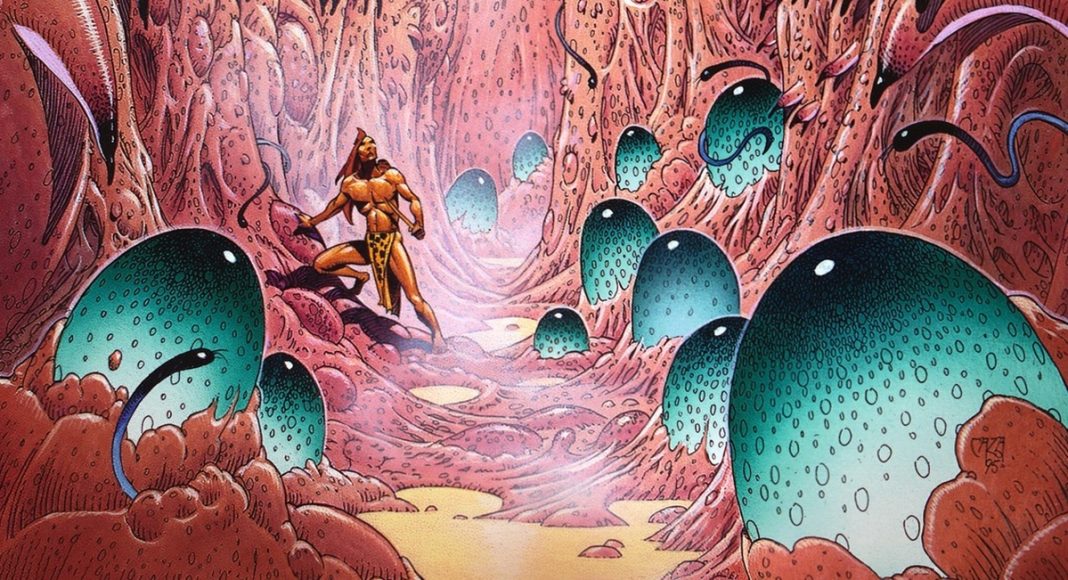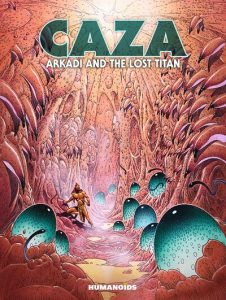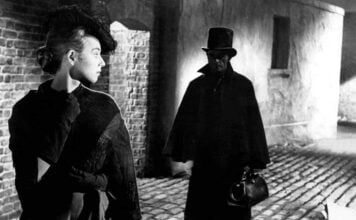 Arkadi and the Lost Titan
Arkadi and the Lost Titan
Cartoonist: Caza
Color Assistant: Scarlett Smulkowski
Translator: Montana Kane
Publisher: Humanoids
Publication Date: March 2025
I set out to review Arkadi and the Lost Titan earlier this year, ahead of the book’s March release date. I don’t remember exactly how many days I gave myself to read it and write my piece, but it was closer to weeks than months–and friends? This was very foolish.
I knew as soon as the review copy arrived that I’d made a mistake. This new book — the first full English language translation of the masterwork of the legendary French cartoonist, Caza — spans more than 500 pages. Available now in a gorgeous, slightly oversized hardcover, it’s an absolute comics slab that collects nine individual tomes along with a prequel. And it tells an amazing, mind-expanding story replete with comics craftmanship of the highest order.
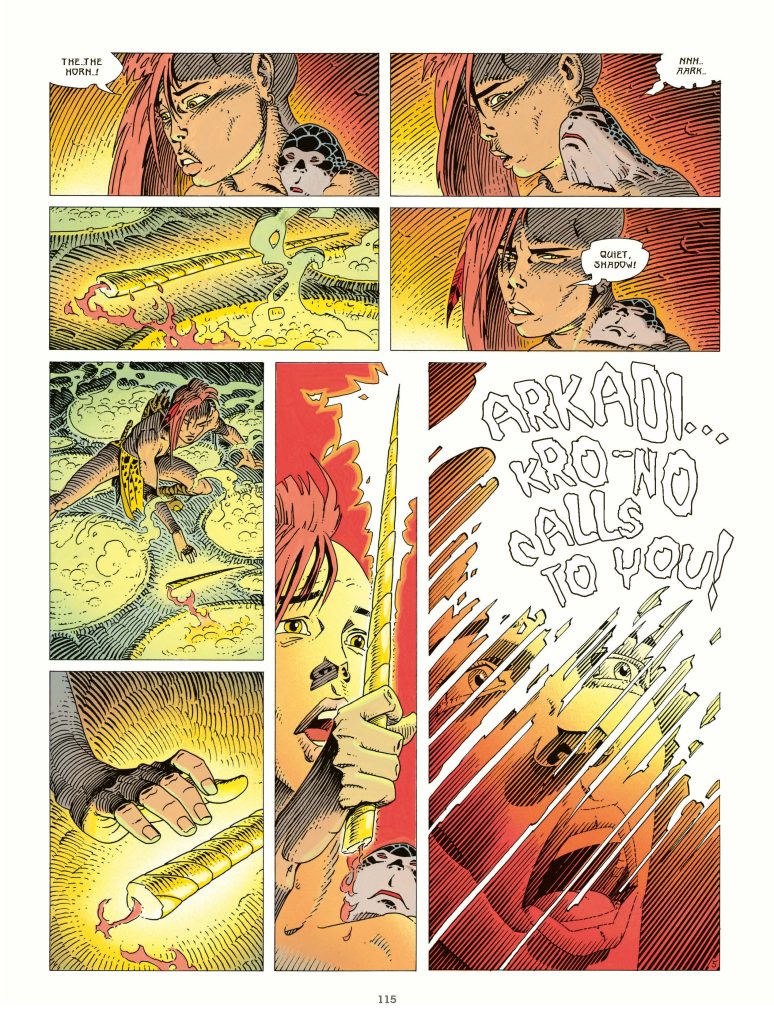
And it’s a lot of comics. So out of necessity, I ultimately read it at a leisurely pace, taking my time with Arkadi and his world, which had the welcome added effect of forcing me to savor the ideas, the cartooning, the generations-spanning metaphysical story, and also the leaps in craftmanship that Caza made over the more than two decades he worked on these comics.
So not to belabor this, but I think reading Arkadi and the Lost Titan over a matter of months rather than weeks is the right move. And, indeed, a long pace is how Caza made his magnum opus. In fact, as Nicolas Trespallé notes in the books afterward, the seeds of this massive achievement were first planted in the 1970s, appearing as character drawings in Caza’s notebooks. As mass-distributed comics proper, this book began publishing in France in 1989, and continued to be made through 2008. I note this not just to make an excuse for how long it took me to post this review (although I am of course also doing that), but to convey that within this book, a reader can see a comics master evolving before their eyes while also being immersed in an epic story.
I don’t mean to disparage the work in the prologue or the early chapters even a little bit by saying that–that work is still stunning and striking. But the second half of Arkadi and the Lost Titan features comics of a level reached by very few cartoonists. Some of this, of course, has to do with these comics having been created during a transition period, in which European comics moved from traditional to digital coloring (as Humanoids publisher Fabrice Giger points out in the book’s intro), but that’s only a small part of it.
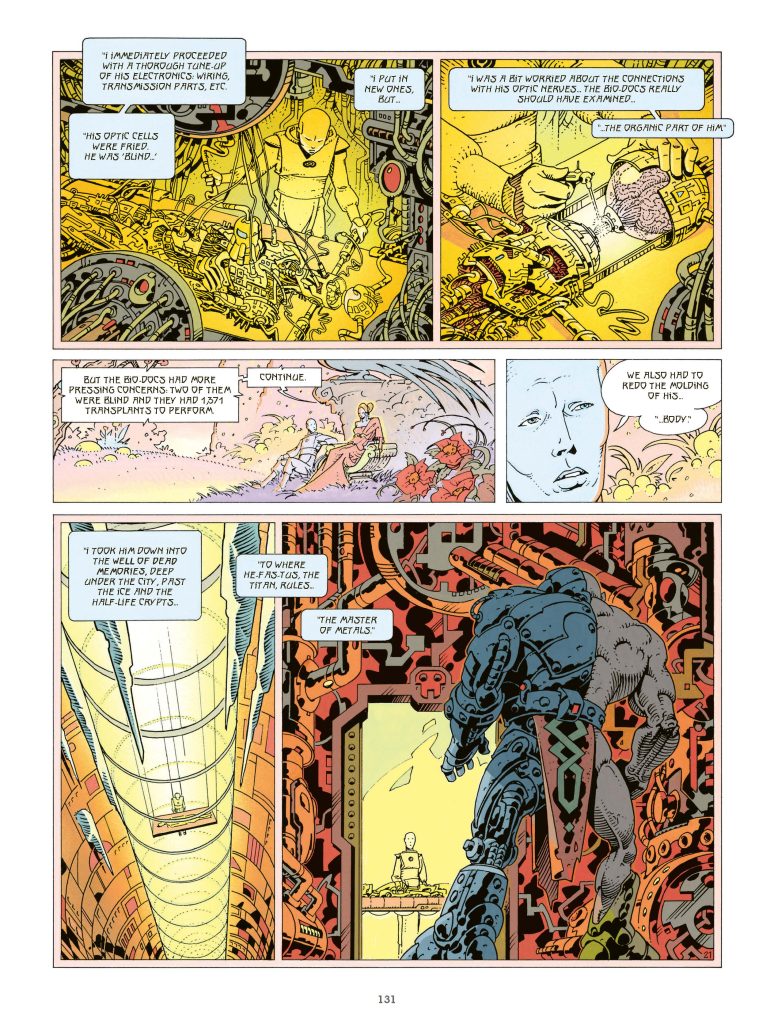
What one notices as they proceed through Arkadi and the Lost Titan is a tangible expansion of the creator’s artistic ambitions, an expansion conveyed through the visual concepts that rapidly grace each page. This is a book that starts as a dead earth barbarian vs. mutant story and ends with a narrative flourish that incorporates psychedelia, contemplations of the nature of existence, and cautionary tales about societal malaise, all conveyed between action-packed battles, harrowing escapes, and classic comic book explosions.
That’s the 20,000 foot view of this book. One can also just read it on its surface level as an engrossing sci-fi/fantasy epic in which a mismatched party of characters journeys with the fate of their no-longer-spinning Earth on the line, hoping to bring a fallen cyborg god to a buried city of the last remaining humans, who have been willingly entombed by an artificial intelligence they created (there’s a lot going on there, and it’s all timely and good). On top of that, there are themes of legacy, family, dream worlds, technology, and more great plot elements. Simply put, it’s just a good read.
But for English-speaking students of comics and comics history, there’s a great opportunity here to savor the first chance to finally read Caza’s comics in our native language. Caza was a contemporary of Mœbius and that certainly shows, but he was also quite clearly an admirer of the late great Richard Corben. In fact, it’s interesting to me that Corben’s own near life-long fantasy epic, Den, also became available in beautiful new hardcovers of late. Maybe this is coincidence. Or maybe there’s something in the air that has lovers/students of art looking for escape while at once contemplating what a ruined world looks like (no cluse what that something might be…heh).
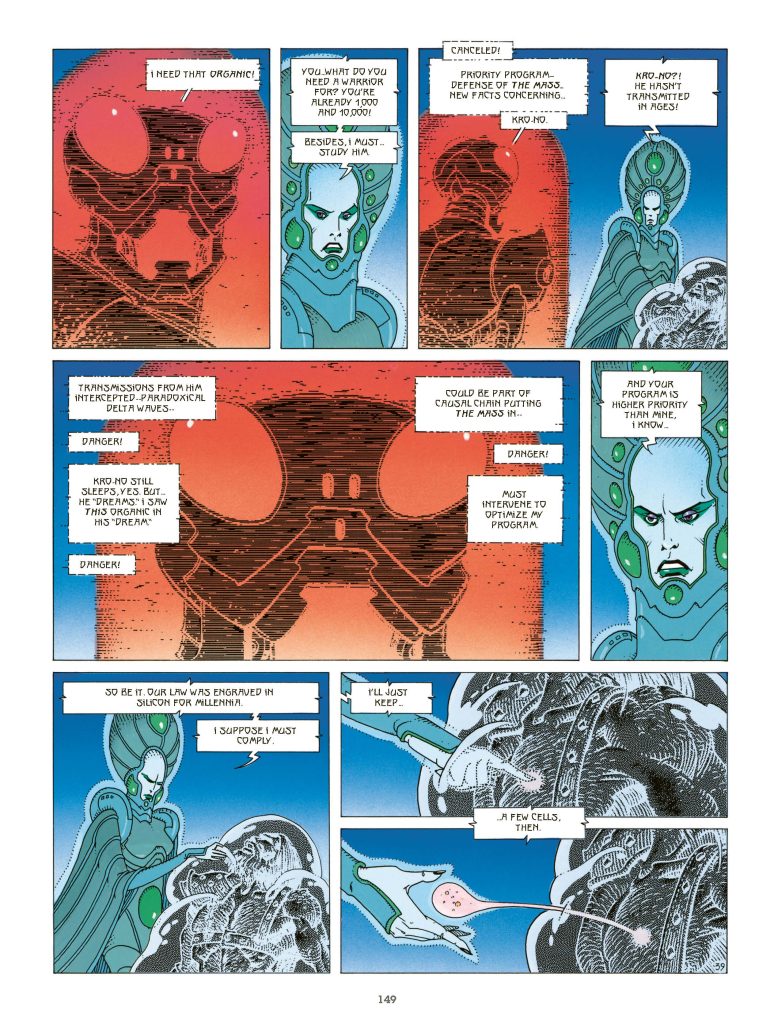
Finally, for a work of its length and scope, Arkadi and the Lost Titan also impresses with just how smooth and coherent it feels as a long read. Within all his evolving, Caza never loses site of the shape of the story he set out to tell. Beats from the prologue matter — and matter a great deal — to how this story eventually ends. The creator gives all the characters in this book weight, if not a vital role to play, while also not being too precious about putting them through devastating revelations or changes. He is in such great command of his story, that he manages a fairly extensive exposition dump within the margins of several pages while right in the thick of heading toward the book’s ending. But by that point, you have so much faith in him as a storyteller (and are so curious about what molded this odd unfamiliar world) that you’ll go with him without hesitation.
In the end, I think the two most salient points I can make about this new edition of Arkadi and the Lost Titan is that it is A. a gorgeous physical artifact, a shining well-designed book that is rich with meaningful extras and worth carving out a good amount of space for on your shelves; and B. that these are must-read comics for students and lovers of the medium, a significant work that both drew from creators of the past and provided inspiration to the mainstream comics artists of the day.
This has been a banner year for great new editions/translastions of complex, high-concept, good-looking sci-fi fantasy epics. You could put a whole shelf together of Corben’s aforementioned Den books, the quirky Dalgoda Omnibus, and the 2000AD complete collection of Shakara. And if you do that, you absolutely must have Arkadi and the Lost Titan on that shelf alongside them.
Arkadi and the Lost Titan is available now from Humanoids
Read more graphic novel reviews from The Beat!


